English Words in Action, Group W
(a variety of English words which have developed through history and are currently used in our modern age)
Simply click on this banner (or the following link) and you will be on your way to stimulate your brain for greater word comprehension with quizzes based on some of the words in this unit.
2. Clever or funny remarks: Mathew has a newspaper that often has witticisms to entertain its readers.
3. Etymology: from Old English wittig, "clever, wise, sagacious."
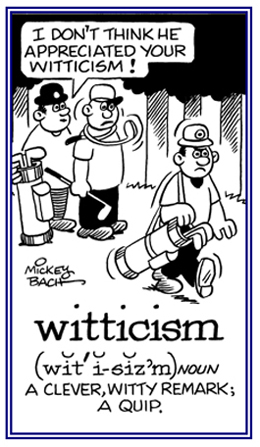
Go to this Word A Day Revisited Index
so you can see more of Mickey Bach's cartoons.
2. Lacking in assurance or confidence; showing anxiety: Uncle Al is so worrisome that he never seems to be calm or without stress about most things.
2. Vexation, dread, or concern: Cancellation of the game because of the weather was the team's main worry.
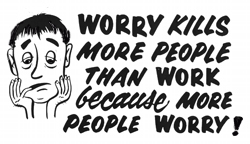
2. To have concern or to be disturbed: A lack of rain is beginning to worry the farmers.
3. Etymology: the word worry now usually means "to be uneasy, to feel anxiety", but it came from a much more worrisome Old English verb, wyrgan, "to strangle, to choke", or "to tear at the throat with the teeth."
People still use the word in this original meaning when they talk about a cat worrying a mouse.
Things to Worry About
If it is good, there is nothing to worry about.
If it is bad, there are two things to worry about: whether we will get well, or whether we will die.
If we get well, there is nothing to worry about.
If we die, there are two things to worry about: whether we go to heaven or go to hell.
If we go to heaven there is nothing to worry about.
If we go to hell, we will be so busy shaking hands with our friends there will be no time to worry!
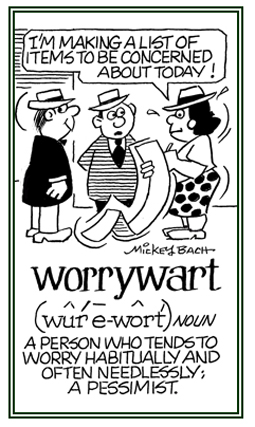
Go to this Word A Day Revisited Index
so you can see more of Mickey Bach's cartoons.
2. To obtain something by a clever method or by persuading someone to do whatever is desired by another person: Ralph was able to wrangle a 10% discount for the fresh apples he bought from the farmer.
3. To care for or to control horses, cattle, etc. on a farm or ranch: Chad has been wrangling horses on his ranch for the last twenty-five years.
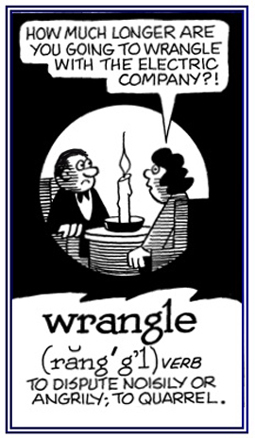
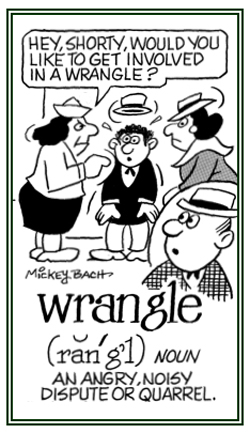
Go to this Word A Day Revisited Index
so you can see more of Mickey Bach's cartoons.
2. To extract something from a person with great difficulty: The lawyer was finally able to wring an answer out of the witness during the trial.
3. To cause a person emotional pain and distress: It was wringing Shirley's heart to see the destruction of the grove of trees that she loved as a child.
2. Relating to efforts to accomplish an objective with serious planning or procedures: Despite all of the arrangements for traveling to Canada during the summer, Jason's carefully wrought plans had to be cancelled because he lost his job and could no longer afford the costs of the trip.
3. Descriptive of something that has been shaped by hammering with tools; primarily, metals or metal work: While Mona was traveling in Europe, she purchased a delicately hand-made wrought silver tray.
Ted was a craftsman who made some finely wrought woodwork for an art exhibition.
4. Etymology: from Middle English, werken, "work"; an archaic past tense and past participle of the verb "to work"; thus, wrought iron is iron that has been worked, forged, or welded into various shapes or forms.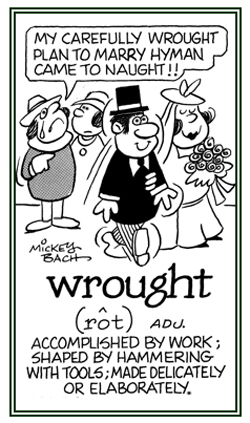
Go to this Word A Day Revisited Index
so you can see more of Mickey Bach's cartoons.
A wry expression or wry humor shows that someone feels a situation is bad, but that he or she may also think it is slightly amusing.
2. Etymology: from Old English wrigian, "to go, to turn, to twist, to bend."
Go to this Word A Day Revisited Index
so you can see more of Mickey Bach's cartoons.
Links to all of the groups of English words in action, Groups A to Z.
You may see the bibliographic list of sources of information for these words in action.

